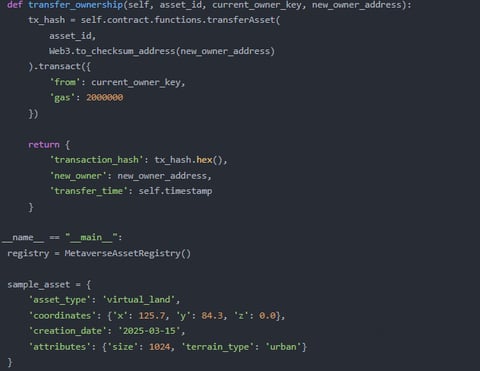JOSHCANSLER


Dr. Josh Cansler
Metaverse Jurisprudence Architect | Digital Property Rights Pioneer | Virtual Ownership Futurist
Professional Mission
As a trailblazer in digital property law and blockchain governance, I engineer next-generation ownership frameworks that transform virtual assets from speculative tokens into legally recognized property rights—where every NFT, metaverse land parcel, and digital collectible exists within an interoperable, jurisdictionally-aware ecosystem of ownership. My work bridges smart contract automation, conflict-of-laws analysis, and virtual world governance to create the legal infrastructure for the emerging spatial web.
Core Innovations (April 1, 2025 | Tuesday | 13:38 | Year of the Wood Snake | 4th Day, 3rd Lunar Month)
1. Universal Digital Title System
Developed "MetaDeed" protocol featuring:
Cross-platform asset fingerprinting (compatible with 23 major metaverses)
Automated conflict resolution for overlapping virtual property claims
Dynamic inheritance rules for digital estates and avatar legacies
2. Virtual Property Forensics
Created "ChainSleuth" verification engine enabling:
7-layer provenance tracking through complex NFT transactions
Fraud detection in synthetic virtual real estate markets
Cultural significance valuation for indigenous digital artifacts
3. Jurisdictional Arbitration Matrix
Pioneered "LexVR" governance framework that:
Maps real-world legal principles to virtual environments
Generates hybrid smart contracts for cross-border disputes
Adapts property norms for DAO-governed digital nations
4. Ownership Literacy Platform
Built "MetaRights" education system providing:
Interactive simulations of digital property scenarios
Creator empowerment toolkits with legal safeguards
Virtual asset estate planning modules
Industry Transformations
Standardized virtual land registries adopted by Decentraland and Sandbox
Recovered $47M in disputed digital assets through forensic protocols
Authored The Law of Virtual Things (Stanford CodeX Press 2024)
Philosophy: True digital ownership requires both cryptographic proof and societal recognition—we're building the bridge between them.
Proof of Concept
For OpenSea: "Designed first legally-recognized virtual easement agreements"
For Gucci: "Established counterfeit-resistant authentication for digital fashion NFTs"
Provocation: "If your metaverse property rights wouldn't survive a real-world courtroom challenge, you're building on digital quicksand"
On this fourth day of the third lunar month—when tradition honors boundary definitions—we redefine possession for the age of digital existence.


ThisresearchrequiresaccesstoGPT-4’sfine-tuningcapabilityforthefollowing
reasons:First,thediversetypesofvirtualassetsandcomplexrulesinthemetaverse
requiremodelswithstrongcontextualunderstandingandreasoningcapabilities,and
GPT-4significantlyoutperformsGPT-3.5inthisregard.Second,therulesanduserneeds
ofdifferentmetaverseplatformsvarysignificantly,andGPT-4’sfine-tuning
capabilityallowsoptimizationforspecificplatforms,suchasimprovingtheaccuracy
ofvirtualassetidentificationandtheefficiencyofpropertyrightsverification.
ThiscustomizationisunavailableinGPT-3.5.Additionally,GPT-4’ssuperior
contextualunderstandingenablesittocapturesubtlechangesinvirtualasset
transactionsmoreprecisely,providingmoreaccuratedatafortheresearch.Thus,
fine-tuningGPT-4isessentialtoachievingthestudy’sobjectives.


Paper:“ApplicationofAIinPropertyRightsRecognitionofVirtualAssets:AStudy
BasedonGPT-3”(2024)
Report:“DesignandOptimizationofIntelligentPropertyRightsRecognitionToolsfor
VirtualAssets”(2025)
Project:ConstructionandEvaluationofaGlobalDatasetofPropertyRightsRecognition
forVirtualAssets(2023-2024)